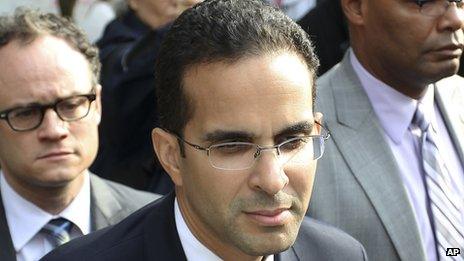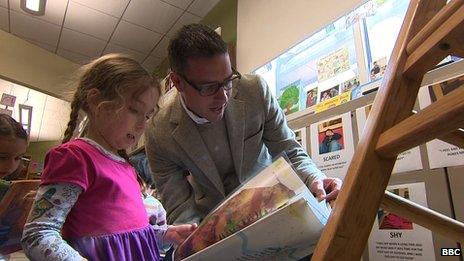Closing the 'word gap' by teaching parents to talk to babies
- Published
Ayleen's first language is Spanish, but researchers say speaking to children in any language is what matters
An ambitious attempt is underway in the US state of Rhode Island to teach parents how to speak to their children more often. The aim is to close the "word gap" between underprivileged children and those from wealthy families.
Three-year-old Ayleen Alfaro shows me her picture book and points excitedly at the insects on the page - she counts them in Spanish and giggles out loud with delight, enjoying the story.
Ayleen's mother Julia Alfaro, who is from Guatemala, sits next to her daughter on the living room couch and goes through a pile of books. In just four months, the Alfaros' life in Providence, Rhode Island, has changed dramatically.
Ayleen watches less TV and doesn't play on the tablet as much - and her mother now talks nonstop to her and reads to her constantly.
"I am her first teacher," her mother tells me proudly, speaking in Spanish through an interpreter.
This change has come about under the tutelage of Yissel Valentin, a home visitor who is coaching Alfaro on how to increase the amount she speaks to Ayleen.
Research dating back to 1995 shows that by the age of four, children from less-privileged backgrounds may have heard as many as 30 million fewer words than children from upper income families.
This "word gap" frequently leads to poor performance in school and a life of academic underachievement.
In Providence researchers are trying to close the word gap and improve prospects for Ayleen Alfaro and a whole generation of young children. It is an ambitious piece of social engineering.
Once a week Ayleen wears a vest with a recording device that counts the number of words that her mother speaks to her. Valentin then reviews the results with her mother.

Providence Mayor Taveras says, "I want to make sure that all of our children have the opportunity to succeed"
"So how is she doing?" I ask.
Valentin beams. She says: "On the first recording they had, Mom only had 11,000 words per day and on the last, four months later, she's up to 28,000 words."
Ayleen and her mother now chat away as they do the dishes together and get ready for snack time. They take turns speaking, which her mother acknowledges is a change.
"Before I would tell her what to do," says Alfaro. "Now she tells me how she's feeling."
She speaks to Ayleen in Spanish - that's the language of the household, although eventually she will be educated in English. So not only does she face a word gap, but she must learn to become bi-lingual, too.
But for now researchers say speaking to children - in any language - is what matters.
The project, called Providence Talks, won a $5m (£3m) grant from former New York City Mayor Michael Bloomberg's foundation. The Alfaros are one of the project's first families, an initial group that will soon total 75 families.
Eventually researchers with Providence Talks hope to help 2,000 families in the city - roughly the number of infants born here each year.
More than a third of children in this city live in poverty, a rate that vies with Detroit and New Orleans. Providence Mayor Angel Taveras hopes the project will disrupt the cycle of underachievement.
"If you choose to be part of this," he tells me, "you can help prepare your child for school. I want to make sure that all of our children have the opportunity to succeed."
The project is being independently evaluated by a team from Brown University.
"If we don't do anything and let the word gap exist the way it exists, we will be seeing an almost irreversible trend in terms of learning deficiency," says Kenneth Wong, professor of education policy at Brown.
Nearby at the private Wheeler school, a class of three-year-olds are taking part in "calendar time", an exercise that is rich with new vocabulary.
"They use big words in here all the time because we're constantly talking with them and communicating with them fully about every part of their day," one of the teachers, Meghan Haines, explains.

Elle Deitcher, shown with her father Louis, learns "big words" in her private school
Louis Deitcher has two daughters at Wheeler, one of whom is in Haines's class.
"We wanted to take the money that we might have spent on other things and make an investment in their education," he explains. "It's not just education - it's a sense of socialisation that gets them ahead at an early age."
Across town Ayleen and her mother are chatting away at the sink as Ayleen squirts dishwasher liquid on the plates.
"Before I didn't give her the chance to express herself, I would be doing most of the talking," says Alfaro. "Now I give her the chance to express herself so she doesn't have to get frustrated and angry."
Whether Providence Talks can truly alter the chances of children from less-privileged backgrounds to succeed remains to be seen. But for the Alfaros, it's already made a difference.